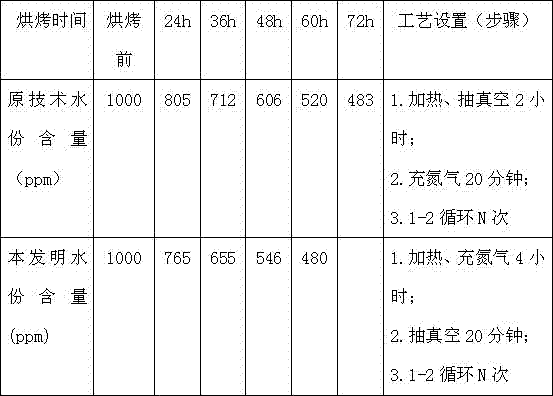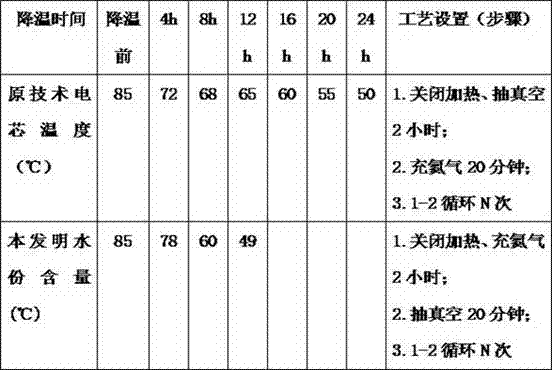Method for quickly drying and cooling lithium ion battery
A lithium-ion battery, rapid drying technology, applied in the direction of drying solid materials, drying solid materials without heating, drying, etc., can solve problems such as battery fragments easily hurting people, batteries are dangerous, battery leakage, etc., and shorten the heating time. and cooling time, improve process efficiency, and save production costs
- Summary
- Abstract
- Description
- Claims
- Application Information
AI Technical Summary
Problems solved by technology
Method used
Image
Examples
Embodiment 1
[0057] The invention discloses a rapid drying and cooling method for a lithium ion battery. The lithium ion battery is placed in an oven, and the heat transfer medium is an inert gas;
[0058] The heating steps are as follows: when heating, fill in inert gas for 40 minutes, keep heating for 6.5 hours, then vacuumize, and cycle accordingly;
[0059] The cooling steps are as follows: stop heating, fill with inert gas for 10 minutes, keep it for 6 hours, then evacuate, and so on.
[0060] In this embodiment, the temperature of the inert gas filled during heating is 40°C; the temperature of the inert gas filled during cooling is -20°C. The inert gas is nitrogen. The number of cycles during heating was 10 times. , the number of cycles during cooling is 5 times.
Embodiment 2
[0062] The invention discloses a rapid drying and cooling method for a lithium ion battery. The lithium ion battery is placed in an oven, and the heat transfer medium is an inert gas;
[0063] The heating steps are as follows: fill in inert gas for 25 minutes during heating, keep heating for 1 hour, then evacuate, and cycle accordingly;
[0064] The cooling steps are as follows: stop heating, fill with inert gas for 40 minutes, keep it for 3.25 hours, and then evacuate, and so on.
[0065] In this embodiment, the temperature of the inert gas filled during heating is 50° C.; the temperature of the inert gas filled during cooling down is 40° C. The inert gas is nitrogen. The number of cycles during heating was 5 times. , the number of cycles during cooling is 1 time.
Embodiment 3
[0067] The invention discloses a rapid drying and cooling method for a lithium ion battery. The lithium ion battery is placed in an oven, and the heat transfer medium is an inert gas;
[0068] The heating steps are: fill in inert gas for 10 minutes during heating, keep heating for 12 hours, then vacuumize, and cycle accordingly;
[0069] The cooling steps are as follows: stop heating, fill with inert gas for 25 minutes, keep it for 0.5 hours, and then evacuate, and so on.
[0070] In this embodiment, the temperature of the inert gas filled during heating is 60°C; the temperature of the inert gas filled during cooling down is -30°C. The inert gas is nitrogen. The number of cycles during heating was 1 time. , the number of cycles during cooling is 10 times.
PUM
 Login to View More
Login to View More Abstract
Description
Claims
Application Information
 Login to View More
Login to View More - R&D
- Intellectual Property
- Life Sciences
- Materials
- Tech Scout
- Unparalleled Data Quality
- Higher Quality Content
- 60% Fewer Hallucinations
Browse by: Latest US Patents, China's latest patents, Technical Efficacy Thesaurus, Application Domain, Technology Topic, Popular Technical Reports.
© 2025 PatSnap. All rights reserved.Legal|Privacy policy|Modern Slavery Act Transparency Statement|Sitemap|About US| Contact US: help@patsnap.com


